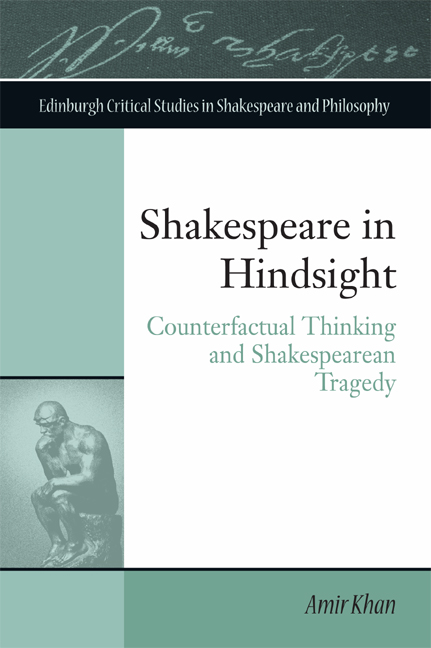Book contents
- Frontmatter
- Contents
- Acknowledgements
- A Note on Texts
- Series Editor's Preface
- Dedication
- 1 Introduction
- 2 My Kingdom for a Ghost: Counterfactual Thinking and Hamlet
- 3 Reversing Good and Evil: Counterfactual Thinking and King Lear
- 4 Staging Passivity: Counterfactual Thinking and Macbeth
- 5 Reversing Time: Counterfactual Thinking and The Winter's Tale
- 6 ‘Why Indeed Did I Marry?’: Counterfactual Thinking and Othello
- 7 Conclusion
- Notes
- Further Reading
- Index
4 - Staging Passivity: Counterfactual Thinking and Macbeth
Published online by Cambridge University Press: 05 August 2016
- Frontmatter
- Contents
- Acknowledgements
- A Note on Texts
- Series Editor's Preface
- Dedication
- 1 Introduction
- 2 My Kingdom for a Ghost: Counterfactual Thinking and Hamlet
- 3 Reversing Good and Evil: Counterfactual Thinking and King Lear
- 4 Staging Passivity: Counterfactual Thinking and Macbeth
- 5 Reversing Time: Counterfactual Thinking and The Winter's Tale
- 6 ‘Why Indeed Did I Marry?’: Counterfactual Thinking and Othello
- 7 Conclusion
- Notes
- Further Reading
- Index
Summary
To consider counterfactual possibilities is to consider, and to want to rescue, a character's freedom. It reflects a critical desire to break from limitations, or limitations of convention. In Macbeth, we are presented with a prophecy that seems to limit the possible ways the play could end. In Hamlet we are given not prophecy, but testimony, which does not restrict Hamlet's freedom in the same way. It makes sense for both Hamlet and us as readers to question the veracity of the Ghost's story. We can conceive of the possibility of the Ghost as a ‘Goblin damned’ (1.4.21), however much we may want its testimony to be true. In Macbeth, on the other hand, to ask something like ‘What if the prophecies aren't true?’ would be to ask, ‘If not, why would Shakespeare give them to us?’ And there is no answer other than to reiterate that because he does, it is by matter of conventional necessity that they come true. Hence no serious critical effort can question the veracity of the sisters’ prophecy in the way Greg called ‘Hamlet's hallucination’ into question. The Ghost's appearance in Hamlet does not dictate as explicitly in what manner Hamlet ought to unfold. The sisters’ prophecy, on the other hand, does have immediate bearing on how Macbeth, and not Macbeth, should end. At some point, Macbeth must serve, or have served, as king. This suggests that Macbeth is far more beholden to outer necessity rather than inner contingency, which further shrinks his sphere of individuality and hence his freedom. So how indeed to (re)capture Macbethe's freedom? If it is imperative for us, as readers, to remember that Macbeth is free, we must consider what sort of critical price we are willing to pay for his freedom.
One way would be to delay, as long as possible, a definitive reading of the precise arrival of Macbeth's ambition. Where Hamlet is burdened by the (im)possibility of correct action, Macbeth is burdened by the (im)possibility of correct thought. Hamlet desires thought as an end to all thinking, as though once armed with correct thought, correct action can only follow. Macbeth operates at an opposite metaphysical pole. He desires correct action as an end to all action, as though once the correct action is carried out, he will no longer be burdened by his desires.
- Type
- Chapter
- Information
- Shakespeare in HindsightCounterfactual Thinking and Shakespearean Tragedy, pp. 89 - 100Publisher: Edinburgh University PressPrint publication year: 2015



